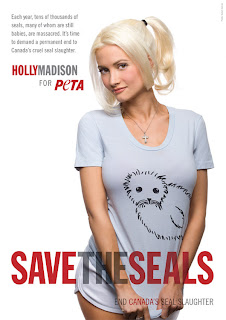There are a variety of animal right's groups but PETA is the most famous, or rather, infamous. Emily brought up, in her blog, how PETA uses offensive advertisements to advocate animal rights but what they show also portrays false information and is always over the top. In Emily's example, PETA's add shows a half naked woman ready for the TSA scan (the full-body can in order to fly an airplane) whose underwear reads "Be proud of your body scan: Go Vegan." This ad is not only exploitative of the woman in the ad but it assumes the vegan diet always makes a person healthier, thin, and sexy. It also implies people do not want to go through the scan because they are ashamed of their bodies (and not because it is an invasion of privacy, Emily pointed out). PETA tends to play off of a serious problem to get the public's attention but the result is a public who does not take animal rights more seriously because they are revolted by the ways PETA protests and speaks up. Emily asked, "Why is PETA the most well-known animal rights group if their methods of effecting change are so problematic?"
PETA is the most well-known animal rights group because they try anything to be noticed. They like to get a rise out of people if it means maybe someone will look past the offensiveness and actually think about animal rights. They like to shock the public but it only gives PETA a bad reputation. In my blog, I have referred to PETA a couple of times because they do have good statistics and information on their site. However, this does not mean I support how they portray women. When I was googling PETA images to put in this blog, there were so many of naked women shown in cages, tied up, put on display as pieces of meat, shown as bloodied body parts, and so on. I understand PETA wants to give off some sort of message... but I have no idea what that message is because I can't get past the fact that these women are being so degraded. PETA could really make a difference for the lives of animals but I don't think their current methods are really helping animals out.
My question to you is: What should PETA do (or not do) in order to grow in popularity, actually get support from the public, and save the lives of animals at the same time?
The least offensive PETA advertisement I could find... and she isn't even wearing pants.



